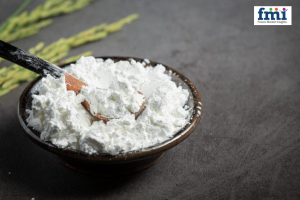Japan Powdered Cellulose Market Set for Strong Growth of USD 31.31 Million Through 2035 | FMI
Rising awareness of natural and functional ingredients is fueling the expansion of powdered cellulose usage in Japan’s manufacturing sectors.
The demand for powdered cellulose in Japan is primarily fueled by the rising popularity of functional food ingredients, dietary fibers, and eco-friendly additives across diverse end-use industries. Key sectors such as pharmaceuticals and industrial manufacturing are anticipated to be major contributors to this demand surge. Furthermore, the growing consumer preference for clean-label products and plant-based formulations is significantly driving the adoption of powdered cellulose, as manufacturers seek sustainable and natural alternatives to conventional ingredients.
Your Guide to Market Intelligence – Download a Sample Copy: https://www.futuremarketinsights.com/reports/sample/rep-gb-18413
Rising Demand for Functional Food Applications of Powdered Cellulose in Japan
Japan’s health-conscious population increasingly favors food products enriched with dietary fibers, positioning powdered cellulose as a critical ingredient in this sector. As a clean-label ingredient in Japanese food formulations, powdered cellulose serves as a valuable dietary fiber source that supports digestive health and satiety. This has led to its widespread use in functional foods aimed at weight management, cholesterol reduction, and gut health enhancement.
Powdered cellulose is recognized for its ability to improve food texture and shelf life without compromising taste or nutritional integrity. The ingredient’s natural texturizing properties make it a preferred bulking agent in dietary supplements and nutritional bars. Manufacturers in Japan are leveraging powdered cellulose to develop innovative food products that meet stringent regulatory standards for food safety and efficacy.
Pharmaceutical-Grade Powdered Cellulose: A Pillar of Japan’s Medical Sector
In addition to food applications, pharmaceutical-grade powdered cellulose plays a pivotal role as an excipient in drug formulations. It functions as a stabilizer and binder in tablets and capsules, ensuring consistent dosage and improved bioavailability. The market in Japan is witnessing increased demand for high-purity powdered cellulose to support the development of advanced pharmaceutical products.
The regulatory framework in Japan mandates rigorous quality standards for pharmaceutical excipients, positioning powdered cellulose suppliers to focus on sustainable sourcing and quality assurance. This regulatory compliance is crucial for maintaining safety while meeting the evolving needs of Japan’s healthcare industry.
Expanding Applications in Japanese Cosmetics and Personal Care Products
The powdered cellulose market in Japan is further benefiting from its growing use in cosmetics and personal care formulations. Known for its natural and eco-friendly properties, powdered cellulose acts as a stabilizer and thickener in creams, lotions, and powders. Japanese consumers’ preference for clean-label, plant-based personal care products is driving manufacturers to incorporate powdered cellulose as a sustainable and biodegradable ingredient.
Furthermore, powdered cellulose is being explored in innovative biodegradable packaging solutions, aligning with Japan’s commitment to environmental sustainability. The eco-friendly cellulose sourcing practices adopted by suppliers enhance the ingredient’s appeal in the cosmetics industry, supporting green manufacturing initiatives.
Access All the Insights You Need – Download Full Report Now: https://www.futuremarketinsights.com/reports/powdered-cellulose-industry-analysis-in-japan
Key Takeaways
• The powdered cellulose market in Japan is forecast to grow at a CAGR of 9.7% through 2035.
• Growth is driven by rising demand for functional foods, dietary fiber, and sustainable additives.
• Pharmaceutical and industrial applications remain crucial demand drivers.
• The clean-label trend and plant-based formulations significantly boost market adoption.
• Strategic mergers and acquisitions are reshaping market competition.
Competition Outlook
The Japan powdered cellulose market is moderately consolidated with several prominent domestic and international players competing on product innovation, quality, and sustainability credentials. Companies are increasingly investing in R&D and forging strategic alliances to strengthen their market positions. Competitive differentiation is largely driven by the ability to offer customized cellulose grades suited for specific applications, regulatory compliance, and eco-conscious sourcing.
• DuPont
• Asahi Kasei
• JRS Pharma
• Daicel Corporation
• Nippon Paper Industries
Explore Functional Food Ingredients Industry Analysis: https://www.futuremarketinsights.com/industry-analysis/functional-food-ingredients
Top Segments Studied in the Powdered Cellulose Market Report
By Formulation:
The industry is segmented into Microcrystalline Cellulose (MCC), Nanocellulose, and Standard Powdered Cellulose.
By Application:
The industry is divided into Food & Beverages, Pharmaceuticals & Nutraceuticals, Personal Care, and Industrial & Packaging.
By Distribution Channel:
The industry is studied based on Direct Sales, Online Retail, and Specialty Stores.
Explore FMI’s related ongoing Coverage in Food and Beverage Domain:
Powdered Cellulose Market: https://www.futuremarketinsights.com/reports/powdered-cellulose-market
Korea Powdered Cellulose Market: https://www.futuremarketinsights.com/reports/powdered-cellulose-industry-analysis-in-korea
Western Europe Powdered Cellulose Market: https://www.futuremarketinsights.com/reports/powdered-cellulose-industry-analysis-in-western-europe
About Future Market Insights (FMI)
Future Market Insights, Inc. (ESOMAR certified, recipient of the Stevie Award, and a member of the Greater New York Chamber of Commerce) offers profound insights into the driving factors that are boosting demand in the market. FMI stands as the leading global provider of market intelligence, advisory services, consulting, and events for the Packaging, Food and Beverage, Consumer Technology, Healthcare, Industrial, and Chemicals markets. With a vast team of over 400 analysts worldwide, FMI provides global, regional, and local expertise on diverse domains and industry trends across more than 110 countries.
Contact Us:
Future Market Insights Inc.
Christiana Corporate, 200 Continental Drive,
Suite 401, Newark, Delaware – 19713, USA
T: +1-347-918-3531
Website: https://www.futuremarketinsights.com
Ankush Nikam
Future Market Insights, Inc.
+91 90966 84197
email us here
Visit us on social media:
LinkedIn
Facebook
YouTube
X
Legal Disclaimer:
EIN Presswire provides this news content "as is" without warranty of any kind. We do not accept any responsibility or liability for the accuracy, content, images, videos, licenses, completeness, legality, or reliability of the information contained in this article. If you have any complaints or copyright issues related to this article, kindly contact the author above.
Whimsy Meets Catastrophe in George Allen Miller’s Award- Winning Fantasy Debut 'The Floating Lake of Dressa Moore'
Future of Audio Integration: Audfly’s New Directional Sound Modules Set to Redefine Smart Devices
Chaunte Hall featured on Trudy Jacobson's Great American Warriors
Więcej ważnych informacji
 Jedynka Newserii
Jedynka Newserii

 Jedynka Newserii
Jedynka Newserii

Handel

Mercosur to tylko wierzchołek góry lodowej. UE ma ponad 40 umów handlowych, które mogą destabilizować rynek rolny
Umowa handlowa między UE a krajami Mercosur może znacząco zaburzyć konkurencję na rynku rolnym i osłabić pozycję unijnych, w tym polskich, producentów – ostrzegają rolnicy i producenci żywności. Umowie sprzeciwia się część krajów unijnych, które domagają się klauzuli ochronnych oraz limitów importowych. – Problemem jest jednak nie tylko ta konkretna umowa. Chodzi o cały system wolnego handlu, który się kumuluje z dziesiątek innych porozumień – podkreśla Andrzej Gantner, wiceprezes Polskiej Federacji Producentów Żywności.
Firma
Dzięki zdalnej weryfikacji tożsamości z wykorzystaniem AI firmy zminimalizowały liczbę oszustw. Rozwiązania wykorzystuje głównie sektor finansowy

Z najnowszych danych Eurostatu wynika, że w 2024 roku 5,9 proc. polskich firm korzystało z rozwiązań z zakresu sztucznej inteligencji. W 2023 roku był to odsetek na poziomie 3,67 proc. Wciąż jednak jest to wynik poniżej średniej unijnej, która wyniosła 13,48 proc. Jednym z obszarów, który cieszy się coraz większym zainteresowaniem wśród przedsiębiorców, jest weryfikacja tożsamości przez AI, zwłaszcza w takich branżach jak bankowość, ubezpieczenia czy turystyka. Jej zastosowanie ma na celu głównie przeciwdziałać oszustwom i spełniać wymogi regulacyjne.
Prawo
Daniel Obajtek: Własne wydobycie i operacyjne magazyny to filary bezpieczeństwa. Zgoda na magazyny gazu poza krajem to rezygnacja z suwerenności energetycznej

Były prezes Orlenu ostrzega przed zmianami w ustawie o zapasach ropy naftowej, produktów naftowych i gazu ziemnego. Jego zdaniem przygotowana przez rząd nowelizacja tzw. ustawy magazynowej i ujednolicanie unijnej polityki energetycznej to zagrożenie dla bezpieczeństwa energetycznego Polski. W jego opinii tylko silna spółka narodowa, własne wydobycie, krajowe magazyny i zbilansowany miks energetyczny zapewnią Polsce bezpieczeństwo i konkurencyjność.
Partner serwisu
Szkolenia

Akademia Newserii
Akademia Newserii to projekt, w ramach którego najlepsi polscy dziennikarze biznesowi, giełdowi oraz lifestylowi, a także szkoleniowcy z wieloletnim doświadczeniem dzielą się swoją wiedzą nt. pracy z mediami.





![Nestlé w Polsce podsumowuje wpływ na krajową gospodarkę. Firma wygenerowała 0,6 proc. polskiego PKB [DEPESZA]](https://www.newseria.pl/files/1097841585/fabryka-nesquik_1,w_85,r_png,_small.png)



.gif)

 |
| |
| |
|